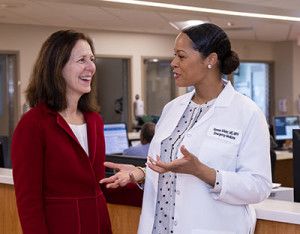You’re not truly successful unless you’re giving back to your community. That’s the tenet Marcee Wilder, MD, MPH, learned from her mother growing up and what she reflected on as she considered her career path. It led Wilder to an emergency medicine residency at Icahn School of Medicine at Mt. Sinai in New York City and a research fellowship at the George Washington University (GW) School of Medicine and Health Sciences (SMHS).

Although her role as a physician allowed her to give back to the community, Wilder realized she could be doing more to improve the lives of people living in at-risk communities.
“I wanted to pursue an academic career,” she says. “I want my research to be important, I want to change policy, and I want to impact many lives.” Wilder’s mentor, research fellowship director Melissa McCarthy, ScD, clinical research director for the Department of Emergency Medicine at SMHS, had a parent grant to explore social determinants of health and how they affect health care costs and utilization. She offered to help Wilder write a diversity supplement, which resulted in a successful two-year award from the National Institutes of Health (NIH).
The NIH’s diversity supplements are designed to provide support for research experiences and mentorship for individuals from groups underrepresented in the biomedical, behavioral and clinical, and social sciences through the academic continuum from high school to the faculty level. “The diversity grant ensures that [Wilder] has the time to do research here. She’s doing research 75 percent of the time and working clinically 25 percent,” explains McCarthy, who also serves as a professor of health policy at the Milken Institute School of Public Health at GW and of emergency medicine at SMHS.
“Normally, it would probably be around 90 to 95 percent clinical, and 5 percent on the side trying to do some research. This really gives her the opportunity to start building her academic career early.” Wilder says that although the supplement covers only two years, it provides enough time to create a body of research capable of propelling an investigator forward to a place where he or she can apply for additional funding or a career development award. “Coming out of residency, you sign a contract to work clinically,” she says. “Normally, you wouldn’t have time to amass the kind of numbers and data to successfully compete for a career development award when working 100 percent clinically. You have to focus on a specific research area for a while and develop some expertise in that area before applying for a career development award or other NIH funding. To come out of residency and step into the fellowship and have this supplement as soon as I started working has been very exciting.” Wilder is researching the impact of social determinants of health on medication adherence as part of McCarthy’s study, which enrolled 8,700 patients at GW Hospital, the OB-GYN clinic at the GW Medical Faculty Associates, and United Medical Center, where she works in the emergency department. The study involves merging health care claims data with interview data collected at the time of enrollment, as well as six and 12 months later. All of the participants enrolled in the study are insured by the D.C. Medicaid program.
The investigators are using the data to determine how changes in patients’ social and living circumstances, such as employment and housing status, affect their health and health care use. Wilder says the researchers gain a sense of the participants’ lives from the interview data. The team builds on that patient information by looking at participants’ health care use through claims data: How many times have they been to the emergency department? If they have congestive heart failure, are they filling their prescriptions and routinely taking their medications? If the subjects are not adhering to their medication regimen, explains Wilder, the team looks to glean additional information from the interviews.
“Do we notice they’re also reporting housing instability, loss of employment, or trouble paying their bills? “These factors cause preventable visits to the emergency department,” she adds. “If you don’t take your COPD or heart failure medication, you’re going to have a heart failure exacerbation and have to come to the emergency room.” There are a number of diversity supplements currently at SMHS, according to Alison Hall, PhD, associate dean for research workforce development at SMHS. Many are for undergraduate and graduate students; this is the first for a faculty member. Supplements, she says, are powerful ways to add researchers to ongoing projects and strengthen the workforce of tomorrow. “SMHS is working hard to enhance the diversity of its researchers,” Hall says. “A supplement is a rapid and impactful way to bring promising researchers into our training programs and faculty.” The work that Wilder and McCarthy are doing allows Wilder to explore her own research goals. “My bigger goals are in researching and addressing health care disparities, which are commonly experienced by patients living with adverse social determinants of health,” she says. “The research I am conducting for the diversity supplement fits in nicely with what I envision my research in the future to be.”



